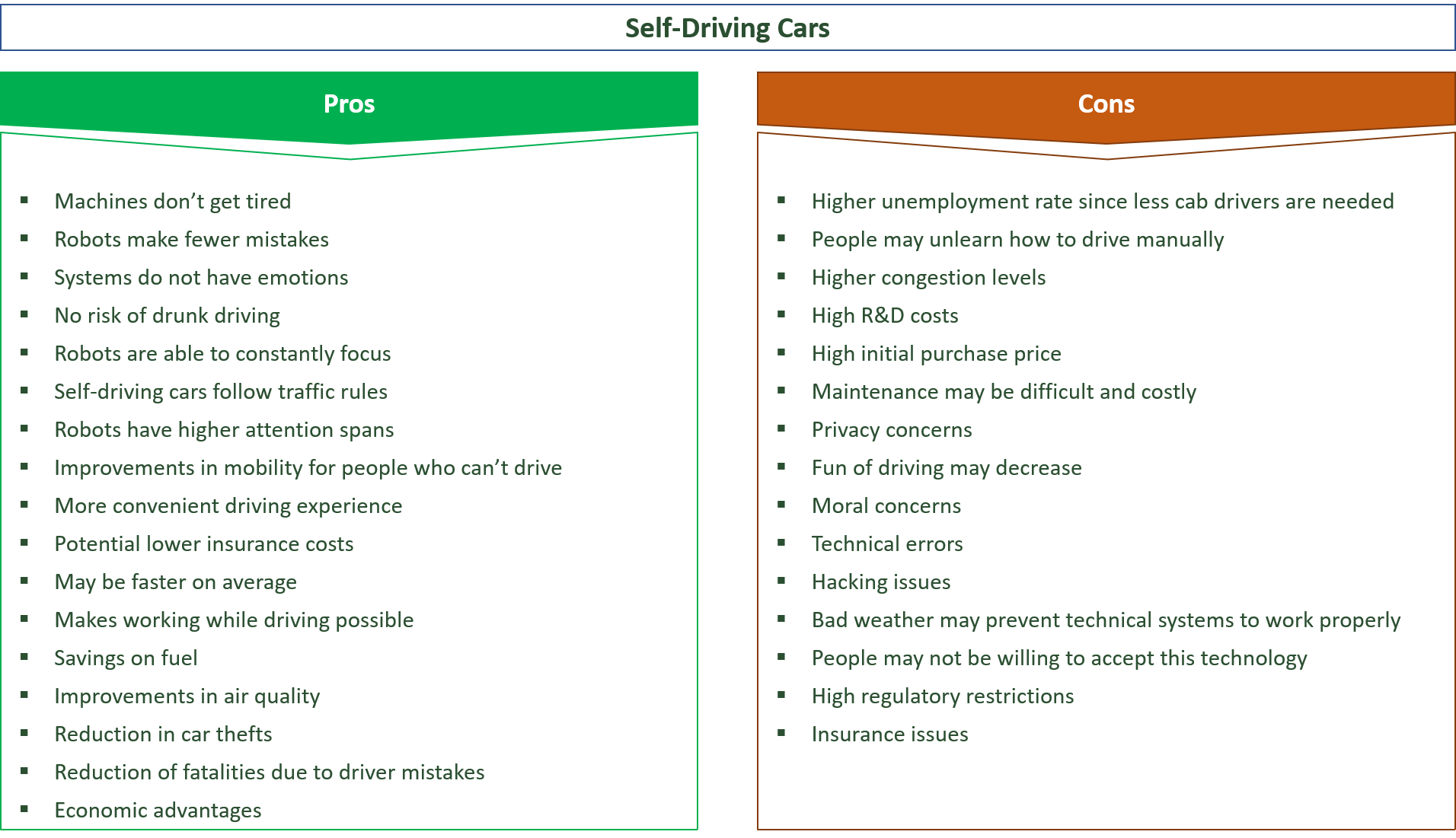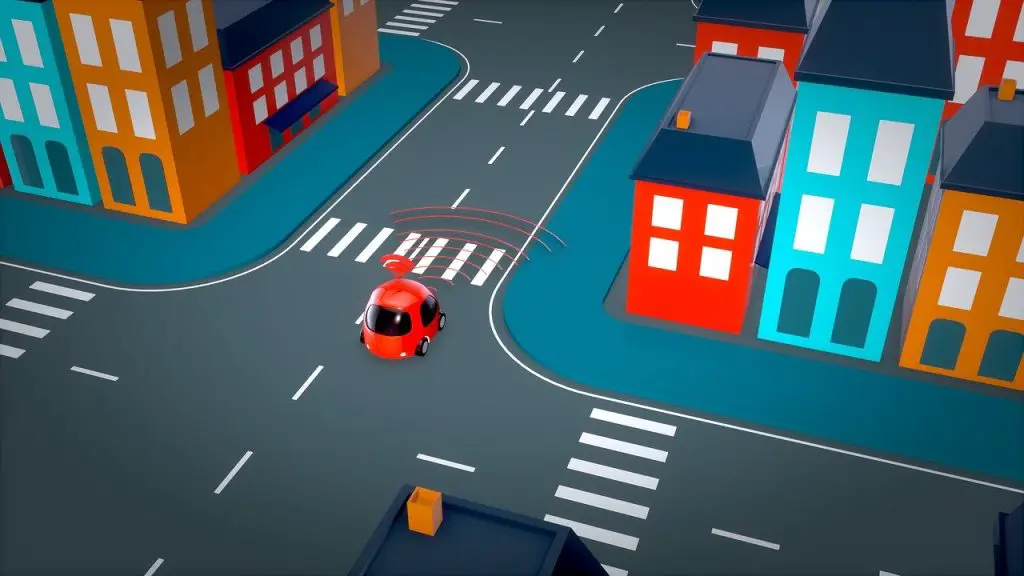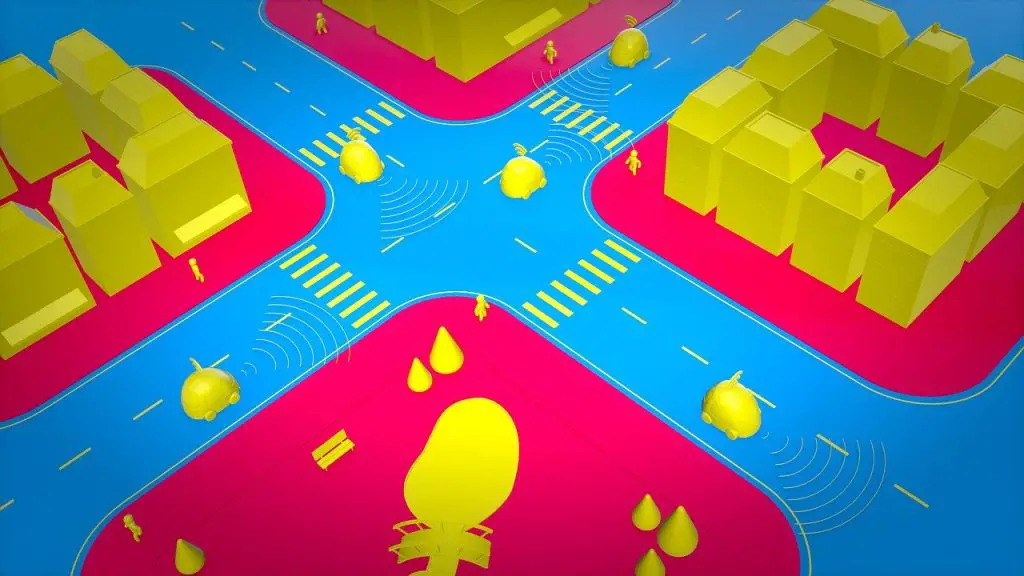“My opinion is it’s a bridge too far to go to fully autonomous cars.”
Elon Musk, Businessman
Advantages & Disadvantages of Self-Driving Cars

Self-driving cars (also often referred to as autonomous cars) have great potential to become the main transportation method in the near future.
Even though there are several benefits related to the use of self-driving vehicles, there are also some issues related to this technology.
In this article, the pros and cons of self-driving cars are examined.
Audio Lesson
Contents
Advantages of Self-Driving Cars
- Machines don’t get tired
- Robots make fewer mistakes
- Systems do not have emotions
- No risk of drunk driving
- Robots are able to constantly focus
- Self-driving cars follow traffic rules
- Robots have higher attention spans
- Improvements in mobility for people who can’t drive
- More convenient driving experience
- Potential lower insurance costs
- May be faster on average
- Makes working while driving possible
- Savings on fuel
- Improvements in air quality
- Reduction in car thefts
- Reduction of fatalities due to driver mistakes
- Economic advantages
Machines don’t get tired
An important advantage of self-driving cars is that unlike humans, machines do not get tired.
Many accidents are caused each year due to the fact that drivers fall asleep while driving their cars.
Thus, by using autonomous cars, drivers could actually fall asleep without causing any trouble since the machine would navigate through the traffic and the number of accidents could be greatly reduced.
Robots make fewer mistakes
In general, robots also make far fewer mistakes compared to humans.
We as humans have so many different things running through our minds that we are not always able to fully concentrate on driving.
This often leads to mistakes and accidents.
Through the use of self-driving cars, those accidents could be prevented since machines will not be distracted and will make fewer or even almost no mistakes at all.
Systems do not have emotions
Many accidents and other issues related to our traffic are often due to the fact that people lose control over their emotions.
People might become angry due to a driving maneuver of another driver and might seek revenge for that.
In contrast, self-driving machines would not become angry at all and would stay rational and safe instead, which could potentially save many lives that would otherwise be lost through traffic accidents.
No risk of drunk driving
Many accidents on our roads also happen since people are driving drunk or under the influence of drugs.
Many people simply underestimate the risk of substance intoxication in conjunction with driving or even do not care at all.
Through the use of self-driving cars, this issue can be mitigated since the car will carry out all tasks and navigate through traffic.
Robots are able to constantly focus
We as humans get distracted by all kinds of things of our daily life.
We may even look at our phones while driving from time to time.
All those distractions increase the likelihood of serious accidents.
However, in contrast to humans, robots are not vulnerable to those kinds of distractions at all.
They simply do what they are programmed to do and chances for accidents are much smaller due to the fact that robots are able to constantly focus on what is happening on the streets.
Self-driving cars follow traffic rules
Self-driving cars will also follow traffic rules.
They would strictly comply with the speed limits and would do everything that traffic safety is ensured.
In contrast, humans often drive faster than the traffic rules would allow them and also sometimes jump a red light, which may in turn lead to an increased chance for traffic accidents.
Robots have higher attention spans
Also, the attention spans of robots are much higher compared to humans.
Since we have a huge information overload in all areas of our daily lives, studies found that humans have a lower attention span than goldfishes.
This low attention span can be extremely dangerous when driving cars since accidents will become much more likely.
Self-driving cars are perfect to solve this issue since their attention span is almost infinite and they will likely not become distracted at all.
Improvements in mobility for people who can’t drive
Especially for people who can’t actually drive, self-driving cars could be a great alternative.
Imagine a pensioner who will no longer be able to drive a car in a safe manner due to health issues or other problems.
For this person, using an autonomous car would be a great way to stay independent since this car could bring the pensioner to the next grocery store whenever he wanted to go there.
Thus, self-driving cars also increase the mobility level of people who would have issues to get around otherwise.
More convenient driving experience
Self-driving cars can also provide a pretty convenient driving experience.
Especially in big cities, commuting to work can be quite exhausting due to traffic jams.
Navigating through the city traffic can stress your nerves and may be quite annoying over time.
By using a self-driving car instead, you could simply sit back and relax since your car will be able to navigate through the traffic.
You could even read a book or do something else you like to do instead of focusing on the traffic.
Potential lower insurance costs
Insurance companies might also reward you for getting a self-driving car since the chances for accidents may be lower and therefore, your insurance premium may become lower as well.
Thus, even though self-driving cars may be more expensive compared to conventional cars, you could save plenty of money on your car insurance in the long run.
May be faster on average
Self-driving cars may also be faster than human drivers when it comes to getting to a certain destination.
Self-driving vehicles process plenty of information every second.
They are able to constantly update the fastest route and may be better able to change directions once they detect traffic jams or other issues compared to humans.
Makes working while driving possible
Once the technology behind autonomous vehicles becomes mature, people may even be able to work while commuting.
Imagine you have a stressful job and have to finalize a presentation pretty soon.
You could use the time in your car for working on your presentation with your laptop while your car would safely navigate through the traffic.
Wouldn’t that be great?!
Savings on fuel
Since self-driving cars are much better to anticipate changes in traffic conditions and therefore could navigate more smoothly, the use of autonomous vehicles may also lead to a decrease in fuel consumption.
Over time, this could save you large amounts of money, which you could use to go even greener at home or also in all other parts of your daily life.
Improvements in air quality
Through a reduction in fuel consumption, also the air quality in big cities could be significantly improved.
Thus, lower fuel consumption due to the use of autonomous vehicles does not only save you plenty of money, it could also improve your ecological footprint.
Reduction in car thefts
Since self-driving cars are usually equipped with quite advanced technology, thieves may refrain from stealing these cars since they fear to get caught pretty soon.
Moreover, these cars may also have additional safety features so they might be almost impossible to steal anyway.
Thus, by buying an autonomous car, also the risk of car thefts would be lowered.
Reduction of fatalities due to driver mistakes
Driving mistakes are the biggest source of deadly car accidents.
Humans are not perfect and make mistakes on a frequent basis. Using autonomous cars may greatly mitigate this issue since machines will make almost no mistakes at all.
Thus, using self-driving cars could greatly reduce the number of fatalities due to car accidents each year.
Economic advantages
There are also economic advantages related to the use of self-driving cars.
Since the number of car accidents could be significantly reduced, also government spending for the police and ambulance could be significantly lowered.
In turn, this would save plenty of taxpayer money.

Disadvantages of Self-Driving Cars
- Higher unemployment rate since fewer cab drivers are needed
- People may unlearn how to drive manually
- Higher congestion levels
- High R&D costs
- High initial purchase price
- Maintenance may be difficult and costly
- Privacy concerns
- Fun of driving may decrease
- Moral concerns
- Technical errors
- Hacking issues
- Bad weather may prevent technical systems to work properly
- People may not be willing to accept this technology
- High regulatory restrictions
- Insurance issues
Higher unemployment rate since fewer cab drivers are needed
Although there are several important advantages to self-driving cars, there are also some problems.
For instance, the use of autonomous cars may lead to higher unemployment in the transportation sector since many cab drivers are no longer needed anymore.
Thus, for this group of people, self-driving cars can be regarded to be rather negative than positive.
People may unlearn how to drive manually
Another issue is that many people will no longer be able to drive manually.
As long as the autonomous vehicle is working properly, this is not a big issue.
However, once the self-driving system suffers from any issues, it might be important to be able to navigate the car manually in a safe manner.
Thus, even if the use of self-driving cars becomes the industry standard, we should still make sure that people have a minimum skill in manual driving in order to solve issues in case the autonomous system fails.
Higher congestion levels
Since self-driving cars are quite convenient, the introduction of this technology might lead to higher congestion levels since the number of cars might increase.
For instance, people who have no driver’s license may just buy an autonomous car.
Thus, if the number of cars on our streets increase, self-driving cars may also imply a negative effect on our environment since more greenhouse gases will be emitted into our atmosphere.
High R&D costs
Even though the technology behind autonomous vehicles is quite promising, plenty of money has still to be invested in order to make it safe enough for mass transportation.
Until this kind of technology is mature enough, hundreds of billions of dollars have to be spent and plenty of research has to be done.
It could take one more decade until we will be able to transit to autonomous cars on a large scale.
High initial purchase price
Especially in the beginning, autonomous cars will be quite expensive.
Industry experts estimate that a self-driving car could cost hundreds of thousands of dollars.
However, this is true for most technologies. In the beginning, they are quite expensive.
Once time goes by and technology improves, the price may drop significantly.
Thus, even though self-driving cars would not be affordable for most people at the beginning, over time, they would likely be affordable for most middle-class families.
Maintenance may be difficult and costly
Since the technology behind autonomous vehicles is not mature yet, so is the knowledge of most mechanics.
Many car repair shops may not be able to fix issues of self-driving cars in a proper manner and owners of those cars may have a hard time finding someone who is experienced enough in this field to fix his car.
Thus, the maintenance of autonomous cars might be quite difficult and also costly.
Privacy concerns
Since plenty of data is needed in order to make autonomous driving possible, critics of autonomous cars often have serious privacy concerns regarding this technology.
For instance, the general public would not be able to track where their data is stored and for what other purposes it might be used.
Thus, autonomous car companies have to make sure that personal data is properly protected and not misused in order to keep the trust of the general public.
Fun of driving may decrease
Many people also enjoy driving their cars very much.
For them, driving their car is their hobby and those people might not be happy with an autonomous car.
Thus, for some people, autonomous cars may not be suitable since they might lose part of the fun regarding the driving experience.
Moral concerns
Autonomous driving is also often criticized due to ethical concerns.
For instance, in case of emergency, an autonomous car has to decide whether it wants to take action A or B.
Let’s assume action A is hitting another car and action B will result in an injury for the driver due to a sidestep.
If there are no other options, the car has to decide whether it wants to save the driver or the other car.
Many people claim that this cannot be justified from an ethical standpoint that we let machines decide when it comes to saving or taking the lives of people.
Technical errors
Even though machines usually do not make too many mistakes, there had been accidents with self-driving cars in the past.
This is also due to the fact that the technology behind self-driving cars is not mature yet.
Over time, the probability of accidents related to self-driving cars will decrease.
Thus, even though technical errors are possible, they are still far less likely than mistakes that are made by humans.
Hacking issues
Another danger of self-driving vehicles are issues related to hacking.
If hackers are able to attack the systems that are needed for self-driving cars to work properly, this could lead to a variety of serious accidents.
Therefore, car companies have to make sure that the underlying data systems are protected properly in order to fight hacking attacks and to assure the safety of autonomous cars.
Bad weather may prevent technical systems to work properly
The sensors of autonomous cars are also vulnerable to bad weather conditions.
For instance, if there is heavy rain or a snowstorm, it is hard for autonomous cars to navigate properly since the sensors might not work in a reliable manner.
Thus, researchers also have to solve this issue before autonomous cars can be used by the general public on a large scale.
People may not be willing to accept this technology
Many people are still quite critical in their attitude towards autonomous cars.
This is quite logical since people often do not want to lose control over things.
For instance, flying is considered to be much safer than driving a car.
However, many people feel more scared in planes compared to cars.
Thus, car companies might have a hard time convincing people that it might be a good idea to use a self-driving car instead of a conventional one.
High regulatory restrictions
Another issue related to autonomous driving is that there might be quite strict regulations in this field.
Any mistake could cost lives, thus, regulators will likely be quite strict regarding the approval of self-driving cars on our streets.
Therefore, car companies might have a hard time convincing regulators regarding the safety of autonomous cars.
Insurance issues
There might also be some issues related to the insurance of autonomous cars.
In case of accidents, there might be plenty of discussions about the question of fault.
Thus, courts will likely be quite busy once autonomous cars will be approved on a large scale.

Top 10 Self-Driving Car Pros & Cons – Summary List
| Self-Driving Car Pros | Self-Driving Car Cons |
|---|---|
| Machines don’t get tired | People may unlearn to drive manually |
| Self-driving cars make fewer mistakes | High R&D costs |
| Autonomous cars follow traffic rules | Technology not mature enough yet |
| No dangers from drunk driving | Technical errors |
| May find the fastest route | Moral concerns |
| No accidents due to emotional behavior | Insurance problems |
| Fuel savings | Low level of acceptance of the public |
| Less air pollution | Danger of hacking attacks |
| Car theft reduction | High purchase price |
| Economic advantages | Privacy concerns |
Conclusion
Even though self-driving cars have many important advantages, there are also some problems related to autonomous driving.
Plenty of money and time has to be invested in additional research until the technology behind self-driving cars will be mature enough to approve them on our streets on a large scale.
However, once this technology becomes sophisticated enough, it will be a serious alternative to the use of conventional cars.
Sources
https://en.wikipedia.org/wiki/Self-driving_car
https://www.ncsl.org/research/transportation/autonomous-vehicles.aspx
https://www.jstor.org/stable/10.7249/j.ctt5hhwgz.11?seq=1#metadata_info_tab_contents

About the author
My name is Andreas and my mission is to educate people of all ages about our environmental problems and how everyone can make a contribution to mitigate these issues.
As I went to university and got my Master’s degree in Economics, I did plenty of research in the field of Development Economics.
After finishing university, I traveled around the world. From this time on, I wanted to make a contribution to ensure a livable future for the next generations in every part of our beautiful planet.
Wanna make a contribution to save our environment? Share it!
